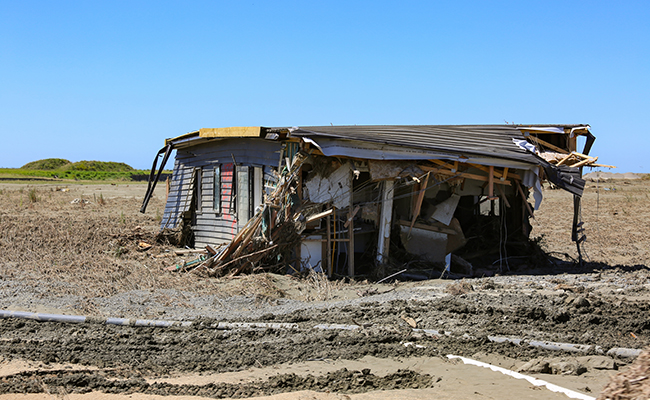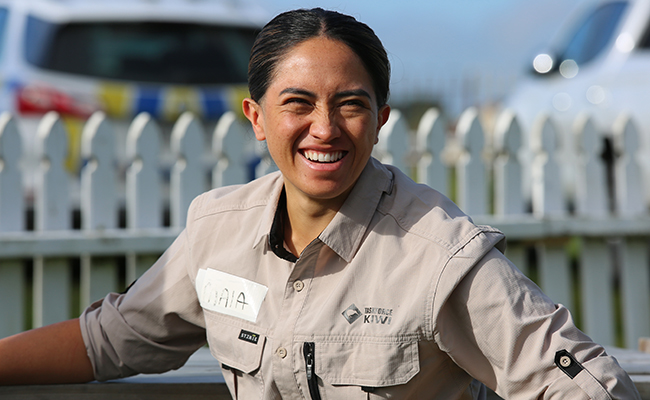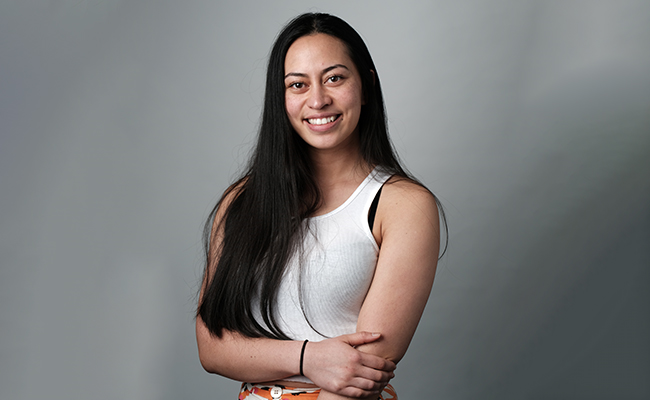
Following the devastation wreaked by Cyclone Gabrielle, three tauira from Otago's Medical School share their experiences. Photo Credit: Heather Joy Milne/Taskforce Kiwi.
When Cyclone Gabrielle hit the North Island in February, trainee interns from the University of Otago, Wellington, on placements in hospitals and general practices in Gisborne and Hawke's Bay were caught up in the worst storm to hit the country in decades.
Three final-year medical students tell their stories:
Maia Tipene Ngāpuhi, Ngāti Awa
At the time Cyclone Gabrielle hit, Maia was on a full-year placement in paediatrics at Hawke's Bay Hospital in Hastings.
As a result of the disaster, the team she was placed with was reduced to a skeleton crew and her assessments were delayed.
“I was working longer hours to help out the over-worked, over-tired and stranded doctors. The hospital was quite busy, and the medical students tried to mobilise to assist the emergency department, but this was difficult to do,” she says. “In an environment like this, you have to be adaptable and flexible.”
Maia says she was only minimally affected compared to other families and communities in the area, but power and communication outages made it hard for her to contact her family.
“Food was lost in the fridge, but that was the extent of it here. My family farm in Motatau in Northland was flooded, and there was a lot of debris clearance and mending of fences required there.”
Maia has been assisting with the emergency response in Hawke's Bay through Taskforce Kiwi, a volunteer organisation made up of active forces, veterans, and emergency responders. She has been deployed on four rotations so far, co-ordinating and leading teams of up to 32 volunteers and working alongside international organisations Disaster Relief Australia and Team Rubicon Canada.
The iwi-led operation has been able to help a lot of communities in the area, Maia says.
“We have been involved in the supply of essential goods, including water and food, road clearance, distribution centre management - and a lot of hard labour.
“Currently, things are looking much better. However, many homes here are uninsured and families are struggling. From a medical perspective, I am worried about the future of these communities. Many whānau are reluctant to leave their silt-damaged homes, putting them at risk of developing respiratory infections and other health problems.
“There is still a lot of work to be done, but the communities are very strong and resilient.”
Maia has been representing Taskforce Kiwi in liaison with organisations including the Hastings City Council; Civil Defence; the Army and Navy; the mental health initiative, Tihei Mauri Ora; the Ministry for Primary Industries and the National Emergency Management Agency; as well as with the General Manager of Māori Health at Health Hawke's Bay, Henry Heke.

Maia Tipene, based in Hawke's Bay Hospital, has been supporting recovery efforts through iwi-led operation Taskforce Kiwi. Photo Credit: Heather Joy Milne/Taskforce Kiwi.
Denver Ruwhiu
Ko Takitimu te waka,
Haruru te maunga,
Mohaka te awa,
Ngāti Pahauwera te hapū,
Ko Hineringa te tangata,
He uri tēnei nō Kahungunu mātangirau!
Denver is based in Hastings for the whole of 2023, and says it was a natural decision to return home for her final year of medical school, with her Dad one of 10 siblings who grew up in the city.
She was completing her medicine placement at Hawke's Bay Memorial Hospital when the cyclone hit.
Denver helped admit patients who were displaced or injured in the flooding and says as trainee interns the medical students in the area were privileged to be in a position to help.
The experience was quite different to placements in previous years when she says students sometimes felt like a burden to the teams they were attached to.
“It has been a unique experience to watch hospital staff do their part. Despite many hospital staff being stranded and unable to get home, they work seamlessly, overtime and without complaint to accommodate every scenario that walks through the doors of the emergency department.
“It makes me excited to join the workforce, knowing that on people's worst days, I will be able to help in a meaningful way.”
Denver says much of the devastation remained unknown until days after the cyclone hit because of the loss of power, phone services, and a general inability to contact anyone.
“As with any small community, though, Hawke's Bay has pulled together in a big way to help out those who were affected. There have been plenty of opportunities to shovel silt or fill up a trailer of contaminated household goods.
“My favourite places to go are our marae. If there is one thing Māori do well, it is hospitality. With so many losing their homes and livelihoods, the marae offers a safe haven, community centre and refuge. I'm very proud to be part of a community and culture who know how to look after each other.”
Denver is now on a general practice placement in Napier and says she continues to hear harrowing stories from people who have lost their homes and livelihoods.
“It is clear the consequences of this cyclone will affect Hawke's Bay for many years to come. Despite all of this, it is a proud and resilient community, and one that I'm very lucky to be a part of.”

Denver Ruwhiu, in Hastings' Hawke's Bay Memorial Hospital, says it was a privilege to be in a position to help and contribute in a meaningful way.
Meremaihi Jackson Ngāti Kahungunu ki Wairarapa, Ngāi Tahu/Kāi Tahu, Ngāti Raukawa (Horowhenua/Manawatū)
Meremaihi was on a six-week general practice placement at the Waikohu Health Centre in Te Karaka and flatting a 30-minute drive away in Gisborne when the cyclone hit.
Without power, mobile service or internet, and with officials advising everyone to stay off the roads, Meremaihi was unable to get to the health centre.
With EFTPOS also down, she used the little cash she had on food and water.
“I was conserving petrol since I didn't have enough cash to pay for more. All the roads out of Gisborne were closed so they actually ran out of petrol in Gisborne as well as some food supplies.”
Meremaihi's house was not damaged in the storm, but she was without power for a day and without mobile or internet coverage for about five days.
“There were major water restrictions for about a week and we had to completely stop using water for two days because the treatment plant failed. The major issues for us were getting food, petrol and water with limited cash and supplies and being cut off from the rest of New Zealand. We had no information about the level of damage in Gisborne, let alone other places in New Zealand.”
Te Karaka, where Meremaihi had been working, was severely affected by the flooding, with many people having to evacuate during the night and being displaced.
She says the experience reinforced the importance of always being prepared for a natural disaster and having an emergency kit with a battery-powered radio, cash, a gas stove or barbecue, emergency water and access to news channels through satellite or cable television.
Meremaihi managed to leave the area on the Saturday after the cyclone.
“I had a pre-booked flight so I flew back to Wellington to sort everything out with the University and see my family.”
She was able to return to the practice in Te Karaka for a day to help out before driving her gear back to Wellington ready to start her paediatric placement which she has switched from Hawke's Bay to the Hutt Valley, to enable her to stay close to her family.